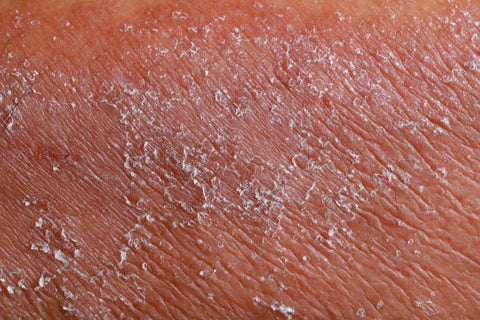What is Ichthyosis?

Ichthyosis is an inherited skin disorder that affects people of all ages.Ichthyosis is a group of genetic skin disorders that affect the way skin cells grow, causing dry, scaly, and thickened skin. This condition can range from mild to severe, and in some cases, can be life-threatening. It’s caused by a mutation in the gene that’s responsible for producing skin cells.
Symptoms of Ichthyosis

The most common symptom of ichthyosis is dry and scaly skin. Other symptoms may include:
- Dry, scaly, and thickened skin
- Itching and skin irritation
- Cracked and painful skin
- Fissures and deep cracks in the skin
- Redness and inflammation
- Increased susceptibility to skin infections
The severity of the symptoms can vary from person to person.
Types of Ichthyosis
There are many different types of ichthyosis, each with its own unique set of symptoms and characteristics. Some of the most common types of ichthyosis include:
- Ichthyosis vulgaris
- X-linked ichthyosis
- Harlequin ichthyosis
- Lamellar ichthyosis
- Congenital ichthyosiform erythroderma
- Netherton syndrome
Causes of Ichthyosis
Ichthyosis is caused by a genetic mutation that affects the way the skin cells grow and develop. The condition can be inherited from one or both parents, depending on the type of ichthyosis. In some cases, ichthyosis can occur as a spontaneous mutation, meaning that there is no family history of the condition.
Diagnosis of Ichthyosis
Ichthyosis can be diagnosed through a physical exam and a skin biopsy. During the physical exam, your doctor will examine your skin and ask you questions about your symptoms and medical history. A skin biopsy involves taking a small sample of skin tissue for examination under a microscope.
Ichthyosis Development
Ichthyosis is an inherited disorder caused by a mutation in the gene that’s responsible for producing skin cells. The mutation can be passed down from parent to child, or it can occur spontaneously in a person without a family history of the disorder. It’s important to note that ichthyosis is not contagious.
Ichthyosis Management
The goal of managing ichthyosis is to reduce symptoms and improve quality of life. Treatment usually involves a combination of topical and oral medications, as well as lifestyle changes.
• Topical medications: These include creams and ointments that help to reduce inflammation and keep the skin moisturized.
• Oral medications: These include antibiotics, anti-inflammatory drugs, and retinoids.
• Lifestyle changes: These include avoiding hot baths and showers, using mild soaps, and avoiding harsh soaps and detergents.
Ichthyosis Treatment
While there is no cure for ichthyosis, there are many treatment options available that can help manage the symptoms and improve the quality of life for people with the condition
- Moisturizing creams and lotions to keep the skin hydrated.
- Topical retinoids to help reduce scaling and thickening of the skin.
- Oral retinoids to help improve skin texture and reduce scaling.
- Antibiotics or antifungal medications to treat skin infections.
- Light therapy to improve skin texture and reduce scaling.
Conclusion
Ichthyosis is an inherited skin disorder that affects people of all ages. It’s characterized by dry, itchy, and scaly skin. Although there is no cure for ichthyosis, there are treatments available to help manage the symptoms and improve quality of life. Treatment usually involves a combination of topical and oral medications, as well as lifestyle changes. It’s important to talk to your doctor about the best treatment plan for you.
Reference
- The Ichthyosis Support Group: https://www.ichthyosis.org.uk/
- National Organization for Rare Disorders: https://rarediseases.org/rare-diseases/ichthyosis/
- Mayo Clinic: https://www.mayoclinic.org/diseases-conditions/ichthyosis/symptoms-causes/syc-20355849
- Genetic and Rare Diseases Information Center: https://rarediseases.info.nih.gov/diseases/5762/ichthyosis
- American Academy of Dermatology: https://www.aad.org/public/diseases/rare-itchy-skin-disorders/ichthyosis
Author: Nikita Vishnoi BCA












